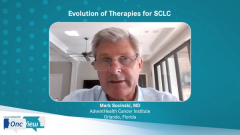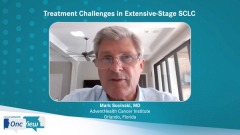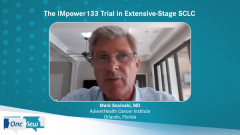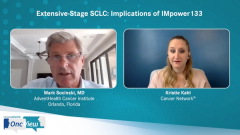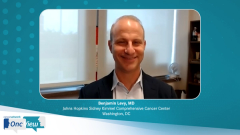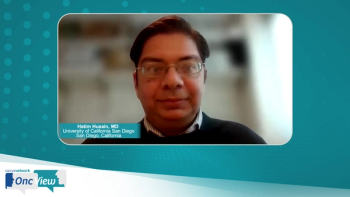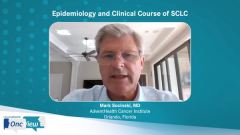
Significance of the IMpower133 Trial in Extensive-Stage SCLC
Dr Benjamin Levy describes how the results of the IMpower133 trial and subsequent FDA approval will impact clinical practice and the outlook for patients with extensive-stage small cell lung cancer.
Episodes in this series

Kristie Kahl: What are the overall implications of IMpower133 for clinical practice now that it’s approved by the FDA and the NCCN [National Comprehensive Cancer Network] added it to its guidelines?
Benjamin Levy, MD: This is a new standard of care for patients with extensive-stage small cell lung cancer. This regimen should be considered in all patients with extensive-stage lung cancer unless they have some contraindication to immunotherapy.
Kristie Kahl: How will you incorporate atezolizumab into your treatment planning?
Benjamin Levy, MD: Every patient who comes here [Sidney Kimmel Comprehensive Cancer Center at Johns Hopkins] is a candidate. Because this regimen came first, we generally use carboplatin-etoposide with atezolizumab. We give 4 cycles. We give the carboplatin-atezolizumab on day 1. We do the etoposide day 1, 2, and 3. We do that every 21 days for 4 cycles, then we continue the atezolizumab until progression. We do not offer PCI, prophylactic cranial irradiation, for our patients. We think the data will suggest that there really is no survival advantage as long as you monitor patients with brain MRIs every 3 to 4 months. This has been practice changing for us.
Kristie Kahl: What are the implications of this approval for patients?
Benjamin Levy, MD: I think that this is clearly a practice changing trial. We have another practice changing trial. We have the addition of durvalumab in combination with platinum-etoposide, the CASPIAN study, that showed the same thing. So we’ve got really 2 strategies with carboplatin-etoposide-atezolizumab and carboplatin-etoposide-durvalumab, both showing survival advantages. It’s dealer’s choice [based on] the institution you’re at. I think having both of these options is important. At our institution, because IMpower133 came first, this is the option we generally use. I see no difference between these 2 regimens, but this is the 1 we generally use in our practice.
Kristie Kahl: Looking ahead, what do you see happening in the future in terms of I/O and small cell lung cancer?
Benjamin Levy, MD: This is a great question. Where are we heading? If we look at choosing the right strategy moving forward, it’s like throwing darts at a dartboard and seeing what lands or throwing spaghetti on a wall and seeing what sticks. We’re not there yet. What we’ve learned over the past 3 years is that there are potentially distinct small cell lung cancer subsets based on the gene expression profile. Many of these distinctions may inform us of the right therapy to use.
Other drugs on the horizon. Certainly, antibody-drug conjugates are still being looked at despite the lack of benefit from Rova-T [rovalpituzumab tesirine] in a phase 3 trial. Epigenetic modifiers are being looked at. PARP inhibitors may have a role in distinct genetic subsets, as I mentioned before. Arginine [amino acid] inhibitors are being looked at, and then a whole host of immunotherapy strategies, including bispecific T-cell engager antibodies and CAR [chimeric antigen receptor] T-cells, which may play a role at some point. The future is bright. Will we get there in 5 or 10 years? I don’t know, but I’m looking forward to it. We’ve made a lot of gains with immunotherapy with the addition of durvalumab or atezolizumab with platinum-etoposide. The future looks good. It’s just going to take a little more time to sort out who the right patient is and the right drugs for that patient.
Kristie Kahl: Thank you so much, Dr Levy. I hope you found the information to be valuable to your clinical practice. Thank you all for watching CancerNetwork’s OneView video series from MJH Studios®.
Transcript edited for clarity.
Newsletter
Stay up to date on recent advances in the multidisciplinary approach to cancer.


